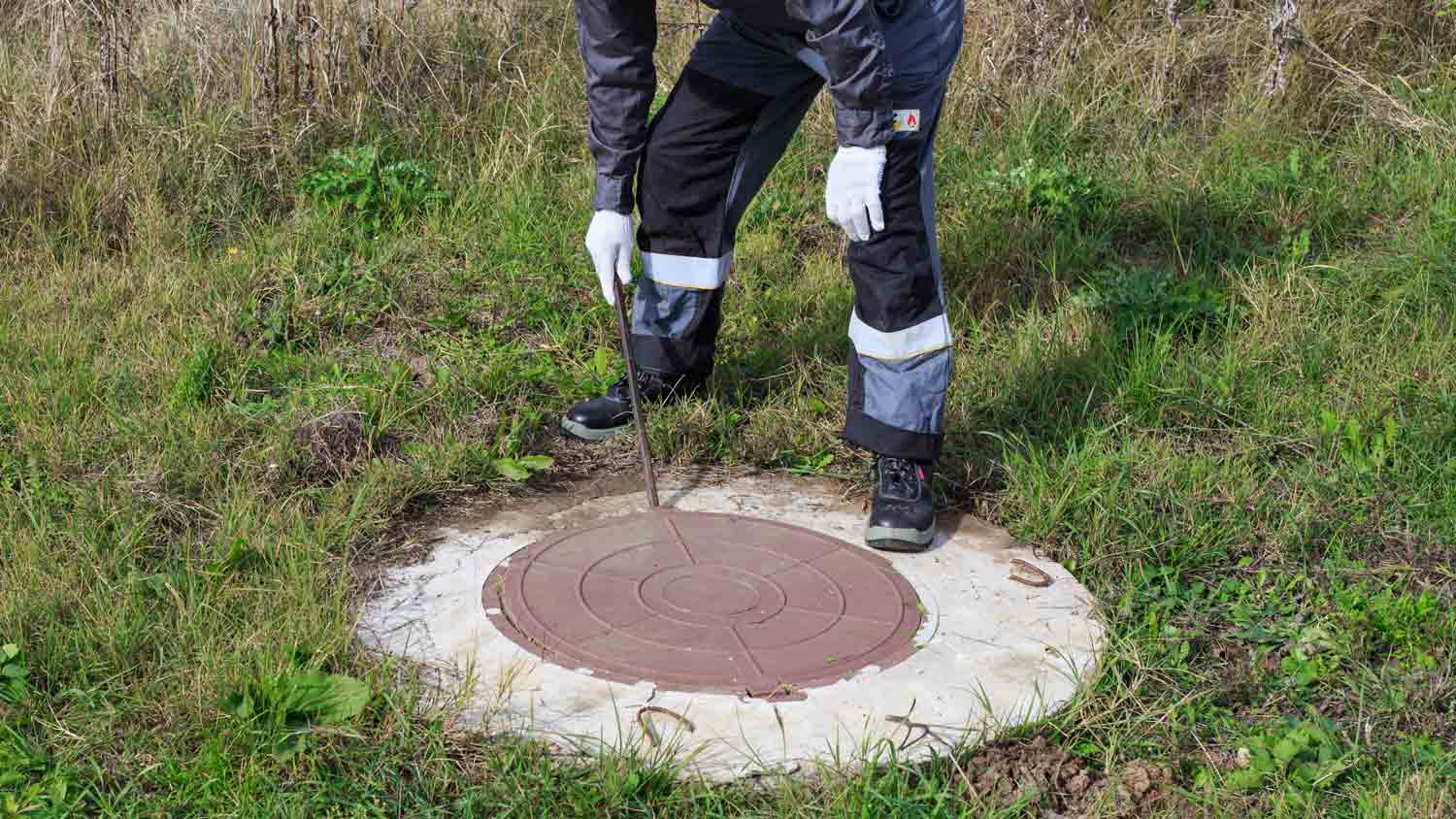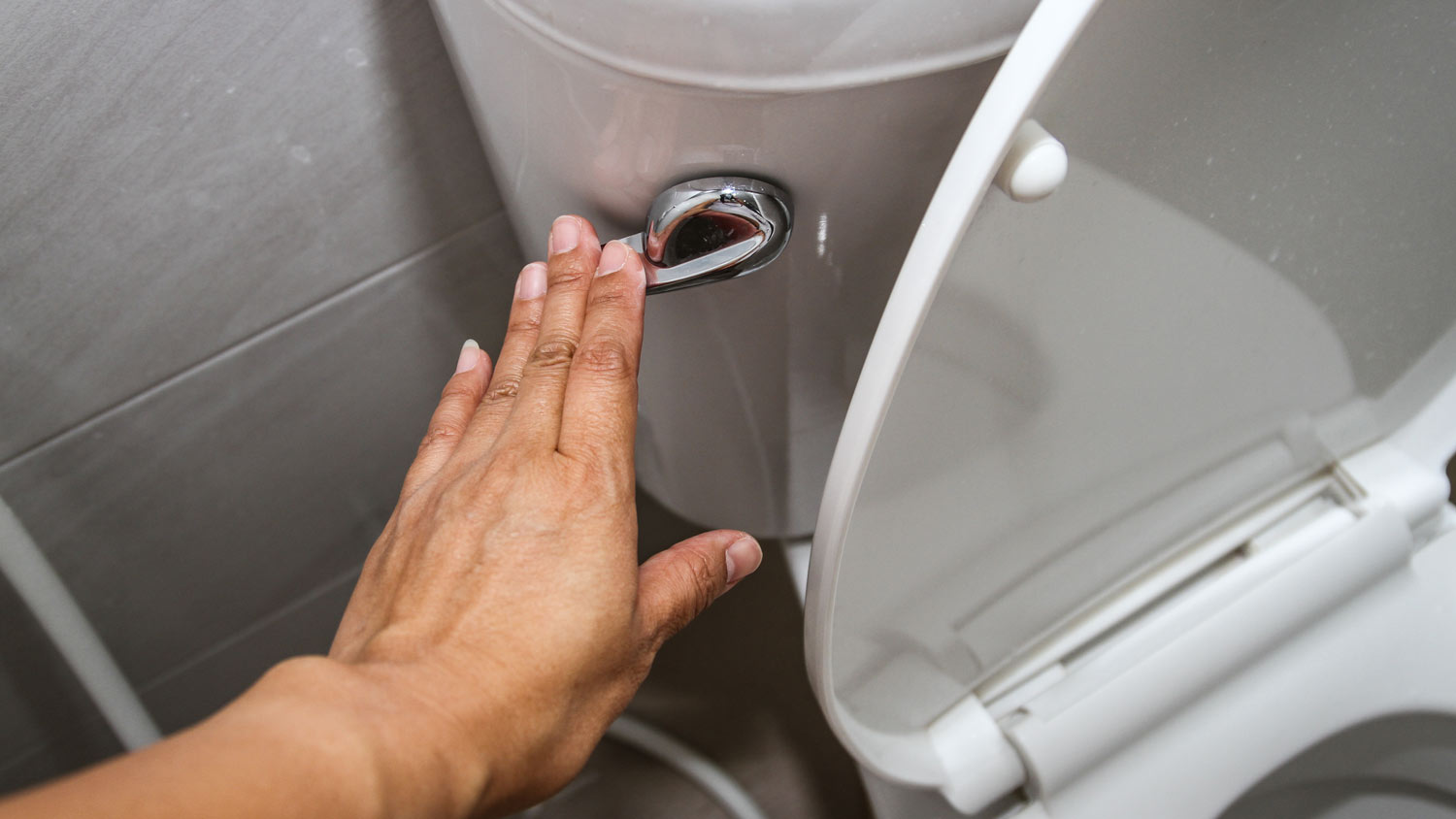
Need to know what sewer line replacement costs? This guide will help you prepare to budget for sewer line replacement done by local contractors.
Step outside to find this critical part of your septic system


Since septic tank repair costs range from $630 to $2,970, a professional can diagnose and fix issues early, preventing them from escalating into a costly replacement.
A septic expert can identify deeper system issues, such as drain field clogs or tank leaks, that DIYers often miss.
Opening or handling cleanouts without training can expose homeowners to raw sewage and gases that pose serious health risks.
DIY attempts to clear blockages can worsen clogs, crack pipes, or damage seals, leading to expensive future repairs.
Certified local septic tank cleaners ensure your system stays compliant with local safety and environmental regulations.
Septic tank cleanouts provide direct access to your septic system, making it easier to clear clogged pipes and fix other septic problems—without having to tear up your yard and dig into your septic tank. So, where is your septic tank cleanout located? Well, it varies. If you’re having trouble locating yours, the following steps can help you track it down.
You might be familiar with some parts of your septic system (like your septic tank and drain field), but do you know what a septic tank cleanout is? In short, a septic tank cleanout (also known as a sewer cleanout) is a pipe that sits outside your home and connects your house and your septic system.
Cleanouts provide an escape route for waste in your septic system, which can help prevent flooding in your home. Your plumber or septic pro may need to access the cleanout if your pipes are clogged or if sewage is backing up in your home. They may also need to open your cleanout while performing a septic tank pumping.

You might decide to open your septic tank cleanout if you have a stubborn clog that won’t go away. Assuming you’ve already tried other tactics (like plunging, pouring boiling water down your blocked drain, and using a baking soda mixture), you can try to remove the cleanout cap and clear the main sewer line clog yourself.
Ideally, you’ll never have to locate or open your septic tank cleanout without professional assistance. But if you’re the DIY type and want to try resolving your plumbing problems without a pro, you’ll need to know where to find your cleanout. Here’s how to do that.
Before you start searching for your septic tank cleanout, it’s important to know what you’re looking for. Generally, cleanouts are made from black, white, or gray PVC piping. However, if you have an older house, your cleanout might be metal. In either case, it should have a removable threaded plug on the end.
To find your cleanout, start by heading to your septic tank. Not sure where yours is? You can find your septic tank by tracing the sewer lines from your home into your yard, looking for dips or dents in your lawn, or pulling up your county records.
Next, walk from your tank toward your home and keep an eye on the ground. Your cleanout will likely be sticking out of the ground within a few feet of the outside of your home. You may need to clear out leaves, bushes, or landscaping over the septic tank that might be blocking it.
Can’t find it? You may need to reach out to a plumber or septic tank company for help.
If you take good care of your septic tank, it can last up to 30 years. To keep your tank functioning properly, you’ll want to have it inspected annually and pumped every three to five years.
It’s also important to be careful about what you put down your toilets and drains. In short, toilet paper and human waste are the only things that should go into your septic system. You should never flush things like baby wipes, diapers, cat litter, or cigarette butts because they can back up your septic system. Never dump harsh chemicals—like ammonia, bleach, insect killers, and gasoline—down the drain because they can damage the tank.
According to data from Angi customers, most homeowners (32.9%) have a pro clean their septic tank every one to four years. However, 24.5% of homeowners don’t know how often they get their septic tank cleaned. We recommend getting your septic tank cleaned every three to five years to avoid sewage backup, slow water draining in your home, and bad smells throughout your property. If you don’t know the last time you got your system cleaned, reach out to a septic company ASAP.
Unclogging your septic tank cleanout is generally fine to do on your own, but it’s best to defer to an expert for more serious septic issues and repairs. If you think that there’s something wrong with your septic tank or another part of your septic system, get in touch with a local septic tank cleaner who can diagnose and fix the issue.
On average, septic tank repairs cost anywhere from $630 to $2,970. If a pro uncovers a major problem, you may need a septic system replacement, which typically costs between $3,460 and $11,360.
These guys are great at what they do. My 20+ year bathroom looks brand new! I highly recommend these guys.
Perry Mike D and Mike L came and installed my water tank and furnace. Couldnt be more happy with the work that was completed and the timely fashion.
I initially hired Zach, through a recommendation from a friend, to replace my hot water tank and ended up needing a furnace replacement. A week before I had my hot water tank replaced - the tank was still working at the time- I had another company come out to clean my furnace. They were...
Replaced 24 year old water heater. Had to bring it up to code(venting,water lines). Gabe arrived right on time. Removed and drained old tank,Hooked up new tank with new vent lines and hooked up gas line and cleaned up just like he wasn t there.All this in less than 2 hours. Very satisfied.
Our installation was an excellent process. We picked our carpet and a couple named Josh and Becky L. came to install it. They were punctual, efficient and professional. We were amazed at how fast the process went. They explained what they were going to do and did it at its finest. They took...
The 2 person team from Harrison Hoe arrived at the beginning of the time window they gave me. They gave me a time window between 9 - 11am. The men were are my house at 9am sharp. Very professional. Completed the work in a timely manner. I had them dig up the access to my septic. They filled...
It went extremely week. They worked very well together. Very efficient. Professional and courteous.
I called on June 8th Monday to see if I could get a hot water tank replaced. I needed pricing and opinions on different options, but mainly needed one asap, as our hot water tank was leaking and pretty much bit the dust!! I spoke with Carrie and explained my situation, and within an hour...
They sprayed for fungus after they identified that that was what it was because my grass wasn’t greening. The fungus problem with my grass seems to be taken care of and I will see how it turns out this year. They get the job done. I think the price is a little high. I contracted with them...
I spoke to Brittany and she never showed up.
From average costs to expert advice, get all the answers you need to get your job done.

Need to know what sewer line replacement costs? This guide will help you prepare to budget for sewer line replacement done by local contractors.

Need to know what sewer line replacement costs in New York, NY? This guide will help you prepare to budget for sewer line replacement done by local contractors.

Need to know what sewer line replacement costs in Charlotte, NC? This guide will help you prepare to budget for sewer line replacement done by local contractors.

Need to know what sewer line replacement costs in Houston, TX? This guide will help you prepare to budget for sewer line replacement done by local contractors.

Need to know what sewer line replacement costs in Minneapolis, MN? This guide will help you prepare to budget for sewer line replacement done by local contractors.

High utility bills are often a sign of trouble. If you’re wondering, “Why is my sewer bill so high?” review this guide for potential causes and fixes.